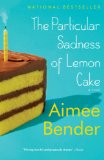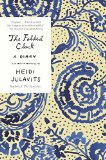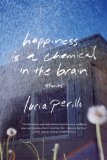Summary | Excerpt | Reading Guide | Reviews | Beyond the book | Read-Alikes | Genres & Themes | Author Bio

A Novel
by Aimee Bender"As I finished that first bite, as that first impression faded, I felt a subtle shift inside, an unexpected reaction." Rose Edelstein, the charming heroine of Aimee Bender's novel, feels this internal "shift" after biting into the chocolate lemon cake her mother has made in honor of her ninth birthday. The first manifestation of the young girl's odd ability to taste the emotions and moods of the makers, bakers, and preparers of foods, the titular lemon cake is the haunting occasion for the novel.
We, along with Rose, quickly realize that she can sense not only her mother's feelings, but the emotions of anyone who has touched the food she consumes. Their sadness and joy, happiness and agony: all their feelings are instantly divinable by the precocious Rose. "Food is full of feelings," she declares rather hopelessly one evening when asked to explain her disappearing appetite to her mother. While her friends are worried about cliques and crushes, Rose must worry over the wellbeing of the lunch ladies who prepare her school meals, the factory workers who package her potato chips and press her waffles, and the clerks who prepare the cellophane-wrapped sandwiches at grocery and convenience stores.
It is around this peculiar premise and through this forceful first-person voice that Bender constructs her evocative novel. Rose's family cannot understand her gift, and Rose herself struggles to cope with her alienating ability. Thankfully, though, Bender is up to the task of describing the many varied foods that comprise the diet of an American teenager, and her persistent attention to culinary detail makes The Particular Sadness of Lemon Cake a delicious delight. Discerning the uniqueness of every possible factory plant and assembly line, Bender is willing to imagine every stage of the planting, harvesting, and processing of food. She is also sensitive enough to the trials and difficulties of adolescence and suburban life to make a rich emotional life for Rose, her family, and her friends. Other writers might have tired of the need to evoke every meal her character consumes, but Bender remains focused on giving descriptions of, and finding meaning in, every crumb and morsel that Rose ingests.
The novel's four parts chronologically track the family's failures and successes as Rose and her brother Joseph move year-by-year through middle and high school, their father tries to find satisfaction in his legal career, and their mother tries to find purpose in her abandoned career and ersatz artistic pursuits. Many years pass between the pages of The Particular Sadness of Lemon Cake, but Bender makes each feel as though it were really unfolding in schooldays and workdays by taking seriously her heroine's emotions and by remaining faithful to the first-person point-of-view that she has chosen: always dwelling in Rose, and allowing her to grow realistically into a mature twenty-something by the fourth and final section. While Rose's parents struggle with their marriage and Joseph tries hard to survive the social and academic pressures of adolescence, Rose masters her mysterious gift: learning to cope with her intimate knowledge of others.
Rose is not the only member of her family burdened by a supernatural ability, and the discovery of her shared peculiarity is one of the most moving features of the novel. Rather than explain Rose's gift or relate it precisely to those of her brother and her grandfather, Bender dwells in the magic and mystery of each individual talent. She lingers in the experiences of her characters rather than bothering with scientific or rational explanations. But to place the novel in the genre of magical realism is to exaggerate the scale of Bender's project and to distract from the very realist depiction of family and food that she has created. Bender takes a magical premise and makes a real story out of it: Rose's coming-of-age narrative unfolds alongside several other smaller, though related, stories of love, and a larger but more subtle commentary on consumption.
![]() This review was originally published in The BookBrowse Review in June 2010, and has been updated for the
April 2011 edition.
Click here to go to this issue.
This review was originally published in The BookBrowse Review in June 2010, and has been updated for the
April 2011 edition.
Click here to go to this issue.

If you liked The Particular Sadness of Lemon Cake, try these:

by Heidi Julavits
Published 2016
A raucous, stunningly candid, deliriously smart diary of two years in the life of the incomparable Heidi Julavits

Happiness Is a Chemical in the Brain
by Lucia Perillo
Published 2013
Set in a small town in the Pacific Northwest, Lucia Perillo's story collection is a sharp-edged, witty testament to the ambivalence of emotions, the way they pull in directions that often cancel one another out or twist their subjects into knots.
Your guide toexceptional books
BookBrowse seeks out and recommends the best in contemporary fiction and nonfiction—books that not only engage and entertain but also deepen our understanding of ourselves and the world around us.